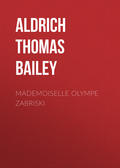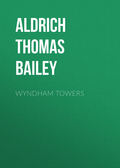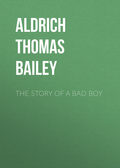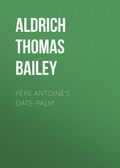
Aldrich Thomas Bailey
The Stillwater Tragedy
XX
Mr. Taggett's diary was precisely a diary,–disjoined, full of curt, obscure phrases and irrelevant reflections,–for which reason it will not be reproduced here. Though Mr. Slocum pondered every syllable, and now and then turned back painfully to reconsider some doubtful passage, it is not presumed that the reader will care to do so. An abstract of the journal, with occasional quotation where the writer's words seem to demand it, will be sufficient for the narrative.
In the opening pages Mr. Taggett described his novel surroundings with a minuteness which contrasted oddly with the brief, hurried entries further on. He found himself, as he had anticipated, in a society composed of some of the most heterogeneous elements. Stillwater, viewed from a certain point, was a sort of microcosm, a little international rag-fair to which nearly every country on earth had contributed one of its shabby human products. "I am moving," wrote Mr. Taggett, "in an atmosphere in which any crime is possible. I give myself seven days at the outside to light upon the traces of Shackford's murder. I feel him in the air." The writer's theory was that the man would betray his identity in one of two ways: either by talking unguardedly, or by indulging in expenditures not warranted by his means and position. If several persons had been concerned in the crime, nothing was more likely than a disagreement over the spoil, and consequent treachery on the part of one of them. Or, again, some of the confederates might become alarmed, and attempt to save themselves by giving away their comrades. Mr. Taggett, however, leaned to the belief that the assassin had had no accomplices.
The sum taken from Mr. Shackford's safe was a comparatively large one,–five hundred dollars in gold and nearly double that amount in bank-notes. Neither the gold nor the paper bore any known mark by which it could be recognized; the burglar had doubtless assured himself of this, and would not hesitate to disburse the money. That was even a safer course, judiciously worked, than to secrete it. The point was, Would he have sufficient self-control to get rid of it by degrees? The chances, Mr. Taggett argued, were ten to one he would not.
A few pages further on Mr. Taggett compliments the Unknown on the adroit manner in which he is conducting himself. He has neither let slip a suspicious word, nor made an incautious display of his booty. Snelling's bar was doing an unusually light business. No one appeared to have any money. Many of the men had run deeply into debt during the late strike, and were now drinking moderately. In the paragraph which closes the week's record Mr. Taggett's chagrin is evident. He confesses that he is at fault. "My invisible friend does not materialize so successfully as I expected," is Mr. Taggett's comment.
His faith in the correctness of his theory had not abated; but he continued his observation sin a less sanguine spirit. These observations were not limited to the bar-room or the workshop; he informed himself of the domestic surroundings of his comrades. Where his own scrutiny could not penetrate, he employed the aid of correspondents. He knew what workmen had money in the local savings-bank, and the amount of each deposit. In the course of his explorations of the shady side of Stillwater life, Mr. Taggett unearthed many amusing and many pathetic histories, but nothing that served his end. Finally, he began to be discouraged.
Returning home from the tavern, one night, in a rather desponding mood, he found the man Wollaston smoking his pipe in bed. Wollaston was a taciturn man generally, but this night he was conversational, and Mr. Taggett, too restless to sleep, fell to chatting with him. Did he know much about the late Mr. Shackford? Yes, he had known him well enough, in an off way,–not to speak of him; everybody knew him in Stillwater; he was a sort of miser, hated everybody, and bullied everybody. It was a wonder somebody didn't knock the old silvertop on the head years ago.
Thus Mr. Wollaston grimly, with his pores stopped up with iron-fillings,–a person to whom it would come quite easy to knock any one on the head for a slight difference of opinion. He amused Mr. Taggett in his present humor.
No, he wasn't aware that Shackford had had trouble with any particular individual; believed he did have a difficulty once with Slocum, the marble man; but he was always fetching suits against the town and shying lawyers at the mill directors,–a disagreeable old cuss altogether. Adopted his cousin, one time, but made the house so hot for him that the lad ran off to sea, and since then had had nothing to do with the old bilk.
Indeed! What sort of fellow was young Shackford? Mr. Wollaston could not say of his own knowledge; thought him a plucky chap; he had put a big Italian named Torrini out of the yard, one day, for talking back. Who was Torrini? The man that got hurt last week in the Dana Mill. Who were Richard Shackford's intimates? Couldn't say; had seen him with Mr. Pinkham, the school-master, and Mr. Craggie,–went with the upper crust generally. Was going to be partner in the marble yard and marry Slocum's daughter. Will Durgin knew him. They lived together one time. He, Wollaston, was going to turn in now.
Several of these facts were not new to Mr. Taggett, but Mr. Wollaston's presentation of them threw Mr. Taggett into a reverie.
The next evening he got Durgin alone in a corner of the bar-room. With two or three potations Durgin became autobiographical. Was he acquainted with Mr. Shackford outside the yard? Rather. Dick Shackford? His (Durgin's) mother had kept Dick from starving when he was a baby,–and no thanks for it. Went to school with him, and knew all about his running off to sea. Was near going with him. Old man Shackford never liked Dick, who was a proud beggar; they couldn't pull together, down to the last,–both of a piece. They had a jolly rumpus a little while before the old man was fixed.
Mr. Taggett pricked up his ears at this.
A rumpus? How did Durgin know that? A girl told him. What girl? A girl he was sweet on. What was her name? Well, he didn't mind telling her name; it was Molly Hennessey. She was going through Welch's Court one forenoon,–may be it was three days before the strike,–and saw Dick Shackford bolt out of the house, swinging his arms and swearing to himself at an awful rate. Was Durgin certain that Molly Hennessey had told him this? Yes, he was ready to take his oath on it.
Here, at last, was something that looked like a glimmer of daylight.
It was possible that Durgin or the girl had lied; but the story had an air of truth to it. If it were a fact that there had recently been a quarrel between these cousins, whose uncousinly attitude towards each other was fast becoming clear to Mr. Taggett, then here was a conceivable key to an enigma which had puzzled him.
The conjecture that Lemuel Shackford had himself torn up the will–if it was a will, for this still remained in dispute–had never been satisfactory to Mr. Taggett. He had accepted it because he was unable to imagine an ordinary burglar pausing in the midst of his work to destroy a paper in which he could have no concern. But Richard Shackford would have the liveliest possible interest in the destruction of a document that placed a vast estate beyond his reach. Here was a motive on a level with the crime. That money had been taken, and that the fragments of the will had been carelessly thrown into a waste-paper basket, just as if the old man himself had thrown them there, was a stroke of art which Mr. Taggett admired more and more as he reflected upon it.
He did not, however, allow himself to lay too much stress on these points; for the paper might turn out to be merely an expired lease, and the girl might have been quizzing Durgin. Mr. Taggett would have given one of his eye-teeth just then for ten minutes with Mary Hennessey. But an interview with her at this stage was neither prudent nor easily compassed.
"If I have not struck a trail," writes Mr. Taggett, "I have come upon what strongly resembles one; the least I can do is to follow it. My first move must be to inspect that private workshop in the rear of Mr. Slocum's house. How shall I accomplish it? I cannot apply to him for permission, for that would provoke questions which I am not ready to answer. Moreover, I have yet to assure myself that Mr. Slocum is not implicated. There seems to have been also a hostile feeling existing between him and the deceased. Why didn't some one tell me these things at the start! If young Shackford is the person, there is a tangled story to be unraveled. Mem: Young Shackford is Miss Slocum's lover."
Mr. Slocum read this passage twice without drawing breath, and then laid down the book an instant to wipe the sudden perspiration from his forehead.
In the note which followed, Mr. Taggett described the difficulty he met with in procuring a key to fit the wall-door at the rear of the marble yard, and gave an account of his failure to effect an entrance into the studio. He had hoped to find a window unfastened; but the window, as well as the door opening upon the veranda, was locked, and in the midst of his operations, which were conducted at noon-time, the approach of a servant had obliged him to retreat.
Forced to lay aside, at least temporarily, his designs on the workshop, he turned his attention to Richard's lodgings in Lime Street. Here Mr. Taggett was more successful. On the pretext that he had been sent for certain drawings which were to be found on the table or in a writing-desk, he was permitted by Mrs. Spooner to ascend to the bedroom, where she obligingly insisted on helping him search for the apocryphal plans, and seriously interfered with his purpose, which was to find the key of the studio. While Mr. Taggett was turning over the pages of a large dictionary, in order to gain time, and was wondering how he could rid himself of the old lady's importunities, he came upon a half-folded note-sheet, at the bottom of which his eye caught the name of Lemuel Shackford. It was in the handwriting of the dead man. Mr. Taggett was very familiar with that handwriting. He secured the paper at a venture, and put it in his pocket without examination.
A few minutes later, it being impossible to prolong the pretended quest for the drawings, Mr. Taggett was obliged to follow Mrs. Spooner from the apartment. As he did so he noticed a bright object lying on the corner of the mantel-shelf,–a small nickel-plated key. In order to take it he had only to reach out his hand in passing. It was, as Mr. Taggett had instantly surmised, the key of Richard's workshop.
If it had been gold, instead of brass or iron, that bit of metal would have taken no additional value in Mr. Taggett's eyes. On leaving Mrs. Spooner's he held it tightly clasped in his fingers until he reached an unfrequented street, where he halted a moment in the shadow of a building to inspect the paper, which he had half forgotten in his satisfaction at having obtained the key. A stifled cry rose to Mr. Taggett's lips as he glanced over the crumpled note-sheet.
It contained three lines, hastily scrawled in lead-pencil, requesting Richard Shackford to call at the house in Welch's Court at eight o'clock on a certain Tuesday night. The note had been written, as the date showed, on the day preceding the Tuesday night in question–the night of the murder!
For a second or two Mr. Taggett stood paralyzed. Ten minutes afterwards a message in cipher was pulsing along the wires to New York, and before the sun went down that evening Richard Shackford was under the surveillance of the police.
The doubtful, unknown ground upon which Mr. Taggett had been floundering was now firm under his feet,–unexpected ground, but solid. Meeting Mary Hennessey in the street, on his way to the marble yard, Mr. Taggett no longer hesitated to accost her, and question her as to the story she had told William Durgin. The girl's story was undoubtedly true, and as a piece of circumstantial evidence was only less important than the elder Shackford's note. The two cousins had been for years on the worst of terms. At every step Mr. Taggett had found corroboration of Wollaston's statement to that effect.
"Where were Coroner Whidden's eyes and ears," wrote Mr. Taggett,–the words were dashed down impatiently on the page, as if he had sworn a little internally while writing them,–"when he conducted that inquest! In all my experience there was never a thing so stupidly managed."
A thorough and immediate examination of Richard Shackford's private workshop was now so imperative that Mr. Taggett resolved to make it even if he had to do so under the authority of a search-warrant. But he desired as yet to avoid publicity.
A secret visit to the studio seemed equally difficult by day and night. In the former case he was nearly certain to be deranged by the servants, and in the latter a light in the unoccupied room would alarm any of the household who might chance to awaken. From the watchman no danger was to be apprehended, as the windows of the extension were not visible from the street.
Mr. Taggett finally decided on the night as the more propitious time for his attempt,–a decision which his success justified. A brilliant moon favored the in-door part of the enterprise, though it exposed him to observation in his approach from the marble yard to the veranda.
With the dense moonlight streaming outside against the window-shades, he could safely have used a candle in the studio instead of the screened lantern which he had provided. Mr. Taggett passed three hours in the workshop,–the last hour in waiting for the moon to go down. Then he stole through the marble yard into the silent street, and hurried home, carrying two small articles concealed under his blouse. The first was a chisel with a triangular piece broken out of the centre of the bevel, and the other was a box of safety-matches. The peculiarity of this box of matches was–that just one match had been used from it.
Mr. Taggett's work was done.
The last seven pages of the diary were devoted to a review of the case, every detail of which was held up in various lights, and examined with the conscientious pains of a lapidary deciding on the value of a rare stone. The concluding entries ran as follow:–
"Tuesday Night. Here the case passes into other hands. I have been fortunate rather than skillful in unmasking the chief actor in one of the most singular crimes that ever came under my investigation. By destroying three objects, very easily destroyed, Richard Shackford would have put himself beyond the dream of suspicion. He neglected to remove these dumb witnesses, and now the dumb witnesses speak! If it could be shown that he was a hundred miles from Stillwater at the time of the murder, instead of in the village, as he was, he must still be held, in the face of the proofs against him, accessory to the deed. These proofs, roughly summarized, are:–
"First. The fact that he had had an altercation with his cousin a short time previous to the date of the murder,–a murder which may be regarded not as the result of a chance disagreement, but of long years of bitter enmity between the two men.
"Secondly. The fact that Richard Shackford had had an appointment with his cousin on the night the crime was committed, and had concealed that fact from the authorities at the time of the coroner's inquest.
"Thirdly. That the broken chisel found in the private workshop of the accused explains the peculiar shape of the wound which caused Lemuel Shackford's death, and corresponds in every particular with the plaster impression taken of that wound.
"Fourthly. That the partially consumed match found on the scullery floor when the body was discovered (a style of match not used in the house in Welch's Court) completes the complement of a box of safety-matches belonging to Richard Shackford, and hidden in a closet in his workshop.
"Whether Shackford had an accomplice or not is yet to be ascertained. There is nothing whatever to implicate Mr. Rowland Slocum. I make the statement because his intimate association with one party and his deep dislike of the other invited inquiry, and at first raised an unjust suspicion in my mind."
The little red book slipped from Mr. Slocum's grasp and fell at his feet. As he rose from the chair, the reflection which he caught of himself in the dressing-table mirror was that of a wrinkled, white old man.
Mr. Slocum did not believe, and no human evidence could have convinced him, that Richard had deliberately killed Lemuel Shackford; but as Mr. Slocum reached the final pages of the diary, a horrible probability insinuated itself in his mind. Could Richard have done it accidentally? Could he–in an instant of passion, stung to sudden madness by that venomous old man–have struck him involuntarily, and killed him? A certain speech which Richard had made in Mr. Slocum's presence not long before came back to him now with fearful emphasis:–
"Three or four times in my life I have been carried away by a devil of a temper which I couldn't control, it seized me so unawares."
"It seized me so unawares!" repeated Mr. Slocum, half aloud; and then with a swift, unconscious gesture, he pressed his hands over his ears, as if to shut out the words.
XXI
Margaret must be told. It would be like stabbing her to tell her all this. Mr. Slocum had lain awake long after midnight, appalled by the calamity that was about to engulf them. At moments, as his thought reverted to Margaret's illness early in the spring, he felt that perhaps it would have been a mercy if she had died then. He had left the candles burning; it was not until the wicks sunk down in the sockets and went softly out that slumber fell upon him.
He was now sitting at the breakfast-table, absently crumbling bits of bread beside his plate and leaving his coffee untouched. Margaret glanced at him wistfully from time to time, and detected the restless night in the deepened lines of his face.
The house had not been the same since Lemuel Shackford's death; he had never crossed its threshold; Margaret had scarcely known him by sight, and Mr. Slocum had not spoken to him for years; but Richard's connection with the unfortunate old man had brought the tragic event very close to Margaret and her father. Mr. Slocum was a person easily depressed, but his depression this morning was so greatly in excess of the presumable cause that Margaret began to be troubled.
"Papa, has anything happened?"
"No, nothing new has happened; but I am dreadfully disturbed by some things which Mr. Taggett has been doing here in the village."
"I thought Mr. Taggett had gone."
"He did go; but he came back very quietly without anybody's knowledge. I knew it, of course; but no one else, to speak of."
"What has he done to disturb you?"
"I want you to be a brave girl, Margaret,–will you promise that?"
"Why, yes," said Margaret, with an anxious look. "You frighten me with your mysteriousness."
"I do not mean to be mysterious, but I don't quite know how to tell you about Mr. Taggett. He has been working underground in this matter of poor Shackford's death,–boring in the dark like a mole,–and thinks he has discovered some strange things."
"Do you mean he thinks he has found out who killed Mr. Shackford?"
"He believes he has fallen upon clews which will lead to that. The strange things I alluded to are things which Richard will have to explain."
"Richard? What has he to do with it?"
"Not much, I hope; but there are several matters which he will be obliged to clear up in order to save himself from very great annoyance. Mr. Taggett seems to think that–that"–
"Good heavens, papa! What does he think?"
"Margaret, he thinks that Richard knew something about the murder, and has not told it."
"What could he know? Is that all?"
"No, that is not all. I am keeping the full truth from you, and it is useless to do so. You must face it like a brave girl. Mr. Taggett suspects Richard of being concerned, directly or indirectly, with the crime."
The color went from Margaret's cheek for an instant. The statement was too horrible and sudden not to startle her, but it was also too absurd to have more than an instant's effect. Her quick recovery of herself reassured Mr. Slocum. Would she meet Mr. Taggett's specific charges with the like fortitude? Mr. Slocum himself had been prostrated by them; he prayed to Heaven that Margaret might have more strength than he, as indeed she had.
"The man has got together a lot of circumstantial evidence," continued Mr. Slocum cautiously; "some of it amounts to nothing, being mere conjecture; but some of it will look badly for Richard, to outsiders."
"Of course it is all a mistake," said Margaret, in nearly her natural voice. "It ought to be easy to convince Mr. Taggett of that."
"I have not been able to convince him."
"But you will. What has possessed him to fall into such a ridiculous error?"
"Mr. Taggett has written out everything at length in this memorandum-book, and you must read it for yourself. There are expressions and statements in these pages, Margaret, that will necessarily shock you very much; but you should remember, as I tried to while reading them, that Mr. Taggett has a heart of steel; without it he would be unable to do his distressing work. The cold impartiality with which he sifts and heaps up circumstances involving the doom of a fellow-creature appears almost inhuman; but it is his business. No, don't look at it here!" said Mr. Slocum, recoiling; he had given the book to Margaret. "Take it into the other room, and read it carefully by yourself. When you have finished, come back and tell me what you think."
"But, papa, surely you"–
"I don't believe anything, Margaret! I don't know the true from the false any more! I want you to help me out of my confusion, and you cannot do it until you have read that book."
Margaret made no response, but passed into the parlor and closed the folding-doors behind her.
After an absence of half an hour she reentered the breakfast room, and laid Mr. Taggett's diary on the table beside her father, who had not moved from his place during the interval. Margaret's manner was collected, but it was evident, by the dark circles under her eyes, and the set, colorless lips, that that half hour had been a cruel thirty minutes to her. In Margaret's self-possession Mr. Slocum recognized, not for the first time, the cropping out of an ancestral trait which had somehow managed to avoid him in its wayward descent.
"Well?" he questioned, looking earnestly at Margaret, and catching a kind of comfort from her confident bearing.
"It is Mr. Taggett's trade to find somebody guilty," said Margaret, "and he has been very ingenious and very merciless. He was plainly at his wits' ends to sustain his reputation, and would not have hesitated to sacrifice any one rather than wholly fail."
"But you have been crying, Margaret."
"How could I see Richard dragged down in the dust in this fashion, and not be mortified and indignant?"
"You don't believe anything at all of this?"
"Do you?" asked Margaret, looking through and through him.
"I confess I am troubled."
"If you doubt Richard for a second," said Margaret, with a slight quiver of her lip, "that will be the bitterest part of it to me."
"I don't give any more credit to Mr. Taggett's general charges than you do, Margaret; but I understand their gravity better. A perfectly guiltless man, one able with a single word to establish his innocence, is necessarily crushed at first by an accusation of this kind. Now, can Richard set these matters right with a single word? I am afraid he has a world of difficulty before him."
"When he returns he will explain everything. How can you question it?"
"I do not wish to; but there are two things in Mr. Taggett's story which stagger me. The motive for the destruction of Shackford's papers,–that's not plain; the box of matches is a puerility unworthy of a clever man like Mr. Taggett, and as to the chisel he found, why, there are a hundred broken chisels in the village, and probably a score of them broken in precisely the same manner; but, Margaret, did Richard every breathe a word to you of that quarrel with his cousin?"
"No."
"He never mentioned it to me either. As matters stood between you and him, nothing was more natural than that he should have spoken of it to you,–so natural that his silence is positively strange."
"He may have considered it too unimportant. Mr. Shackford always abused Richard; it was nothing new. Then, again, Richard is very proud, and perhaps he did not care to come to us just at that time with family grievances. Besides, how do we know they quarreled? The village is full of gossip."
"I am certain there was a quarrel; it was only necessary for those two to meet to insure that. I distinctly remember the forenoon when Richard went to Welch's Court; it was the day he discharged Torrini."
A little cloud passed over Margaret's countenance.
"They undoubtedly had angry words together," continued Mr. Slocum, "and we are forced to accept the Hennessey girl's statement. The reason you suggest for Richard's not saying anything on the subject may suffice for us, but it will scarcely satisfy disinterested persons, and doesn't at all cover another circumstance which must be taken in the same connection."
"What circumstance?"
"His silence in regard to Lemuel Shackford's note,–a note written the day before the murder, and making an appointment for the very night of it."
The girl looked steadily at her father.
"Margaret!" exclaimed Mr. Slocum, his face illuminated with a flickering hope as he met her untroubled gaze, "did Richard tell you?"
"No," replied Margaret.
"Then he told no one," said Mr. Slocum, with the light fading out of his features again. "It was madness in him to conceal the fact. He should not have lost a moment, after the death of his cousin, in making that letter public. It ought instantly to have been placed in Coroner Whidden's hands. Richard's action is inconceivable, unless–unless"–
"Do not say it!" cried Margaret. "I should never forgive you!"
In recapitulating the points of Mr. Taggett's accusation, Mr. Slocum had treated most of them as trivial; but he had not been sincere. He knew that that broken chisel had no duplicate in Stillwater, and that the finding of it in Richard's closet was a black fact. Mr. Slocum had also glossed over the quarrel; but that letter!–the likelihood that Richard kept the appointment, and his absolute silence concerning it,–here was a grim thing which no sophistry could dispose of. It would be wronging Margaret to deceive her as to the vital seriousness of Richard's position.
"Why, why did he hide it!" Mr. Slocum persisted.
"I do not see that he really hid it, papa. He shut the note in a book lying openly on the table,–a dictionary, to which any one in the household was likely to go. You think Mr. Taggett a person of great acuteness."
"He is a very intelligent person, Margaret."
"He appears to me very short-sighted. If Richard were the dreadful man Mr. Taggett supposes, that paper would have been burnt, and not left for the first comer to pick up. I scorn myself for stooping to the suggestion!"
"There is something in the idea," said Mr. Slocum slowly. "But why did Richard never mention the note,–to you, or to me, or to anybody?"
"He had a sufficient reason, you may be sure. Oh, papa, how ready you are to believe evil of him!"
"I am not, God knows!"
"How you cling to this story of the letter! Suppose it turns out to be some old letter, written two or three years ago? You could never look Richard in the face again."
"Unfortunately, Shackford dated it. It is useless for us to blindfold ourselves, Margaret. Richard has managed in some way to get himself into a very perilous situation, and we cannot help him by shutting our eyes. You misconceive me if you imagine I think him capable of coolly plotting his cousin's death; but it is not outside the limits of the possible that what has happened a thousand times may have happened once more. Men less impulsive than Richard"–
"I will not listen to it!" interrupted Margaret, drawing herself up. "When Richard returns he will explain the matter to you,–not to me. If I required a word of denial from him, I should care very little whether he was innocent or not."
Mr. Slocum threw a terrified glance at his daughter. Her lofty faith sent a chill to his heart. What would be the result of a fall from such a height? He almost wished Margaret had something less of that ancestral confidence and obstinacy the lack of which in his own composition he had so often deplored.
"We are not to speak of this to Richard," he said, after a protracted pause; "at least not until Mr. Taggett considers it best. I have pledged myself to something like that."
"Has Richard been informed of Mr. Taggett's singular proceeding?" asked Margaret, freezingly.
"Not yet; nothing is to be done until Mr. Taggett returns from New York, and then Richard will at once have an opportunity of clearing himself."
"It would have spared us all much pain and misunderstanding if he had been sent for in the first instance. Did he know that this person was here in the yard?"
"The plan was talked over before Richard left; the details were arranged afterwards. He heartily approved of the plan."
A leisurely and not altogether saint-like smile crept into the corners of Margaret's mouth.
"Yes, he approved of the plan," repeated Mr. Slocum. "Perhaps he"–Here Mr. Slocum checked himself, and left the sentence flying at loose ends. Perhaps Richard had looked with favor upon a method of inquiry which was so likely to lead to no result. But Mr. Slocum did not venture to finish the suggestion. He had never seen Margaret so imperious and intractable; it was impossible to reason or to talk frankly with her. He remained silent, sitting with one arm thrown dejectedly across the back of the chair.







